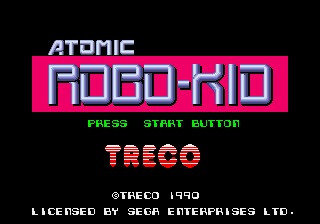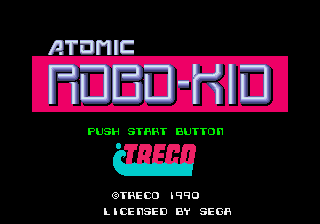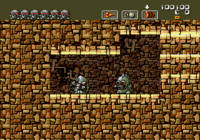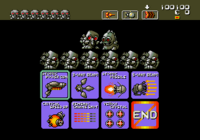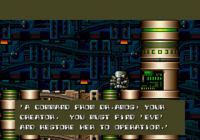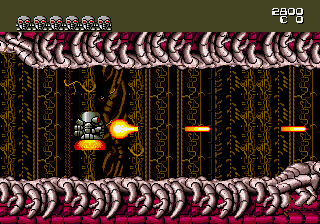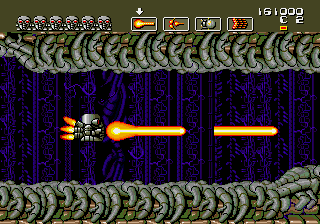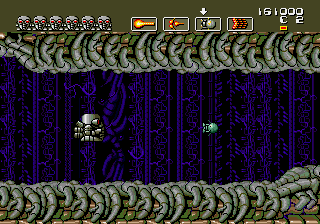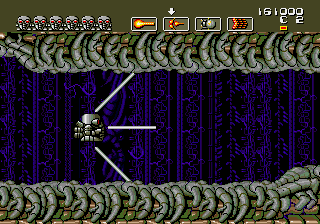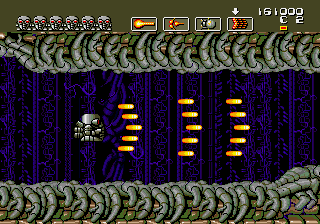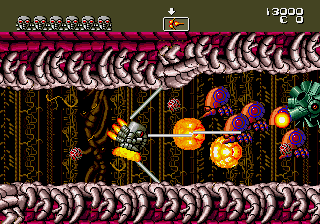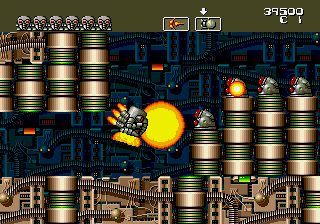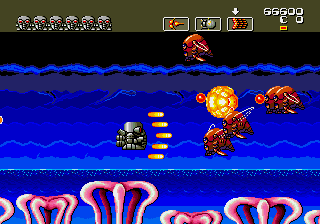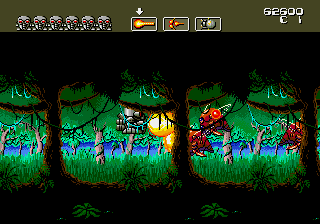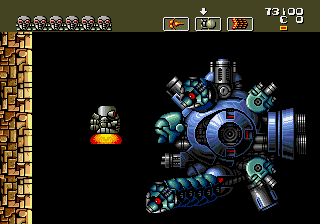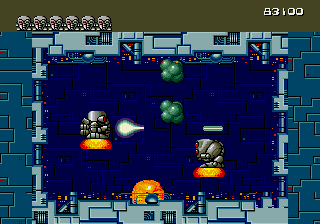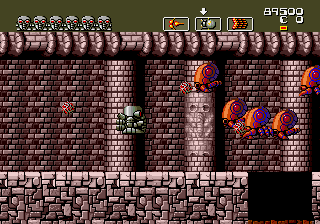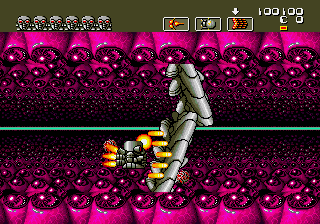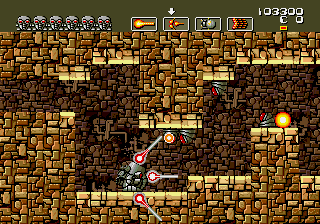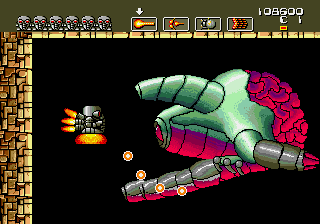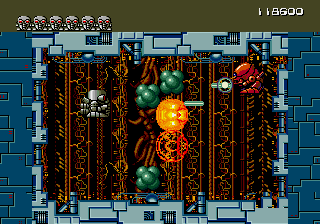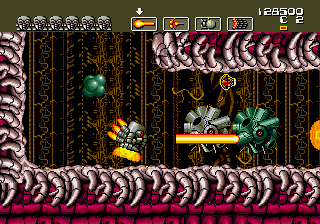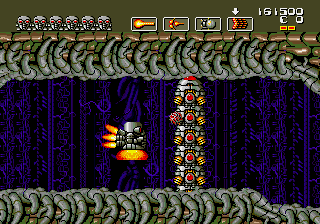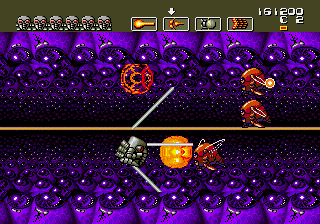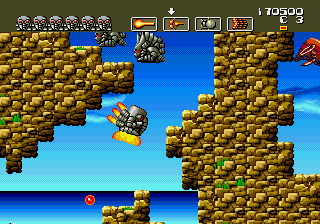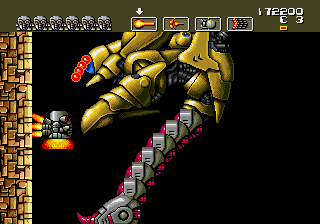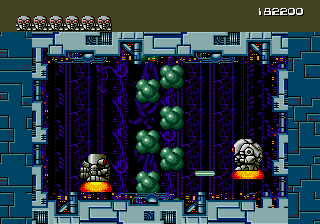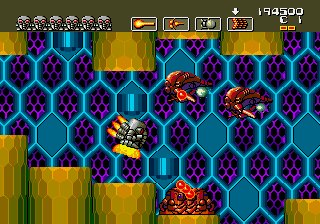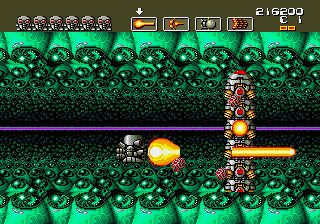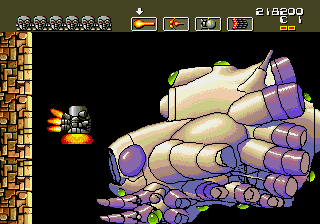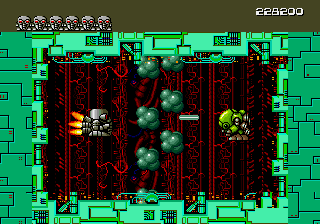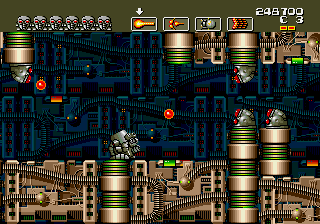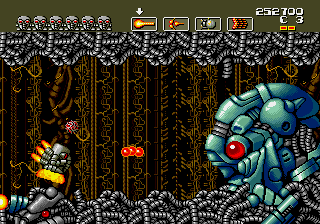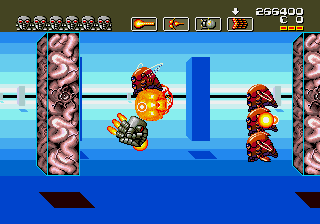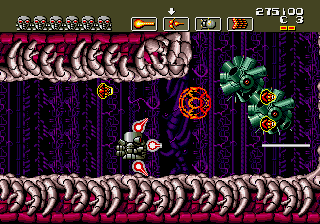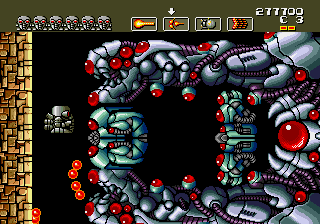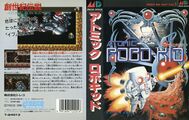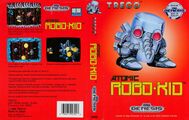Atomic Robo-Kid
From Sega Retro
| |||||||||||||||
| Atomic Robo-Kid | |||||||||||||||
|---|---|---|---|---|---|---|---|---|---|---|---|---|---|---|---|
| System(s): Sega Mega Drive | |||||||||||||||
| Publisher: Treco | |||||||||||||||
| Developer: Khaos[1] | |||||||||||||||
| Original system(s): Arcade boards | |||||||||||||||
| Developer(s) of original games: UPL | |||||||||||||||
| Sound driver: SMPS Z80 (banked) | |||||||||||||||
| Genre: Action[2] | |||||||||||||||
| Number of players: 1 | |||||||||||||||
| Official in-game languages: | |||||||||||||||
| |||||||||||||||
|
Atomic Robo-Kid (アトミック・ロボキッド) is a Sega Mega Drive shoot-'em-up game developed by Khaos and published by Treco. A port of the titular 1988 UPL arcade title Atomic Robo-Kid, the game was first released in Japan in December 1990, and was later released in the United States in February of the following year.
Contents
Story
Earth outpost colony Terra-12 has been bombarded from space with strange radiation. The radiation is hideously mutating all of the transplanted life on the colony, and a fleet of hostile aliens has the radiation wave and invaded the planet. The small battle robot called the Atomic Robo-Kid is tasked with saving the colony. Along the way, Robo-Kid learns that he must find and rescue Eve, a female biodroid who has the ability to cure the mass mutations.
Gameplay
The game is a side-scrolling shoot-'em-up in which the player controls the elephantine battle robot Atomic Robo-Kid against an alien invasion. Stages do not scroll automatically, as they do in most shoot-'em-up games. Stages consist of battling through hordes of enemies to reach the portal at the end, which is usually defended by a larger enemy. Most portals lead to another stage, but some portals lead to a fight against a massive alien "governor," which is followed by a duel against another robot resembling Robo-Kid. After these fights, Robot-Kid converses with the "CPU" and receives more information about his mission. Some stages end with multiple portals, giving the player the choice over which zone to enter next.
Robo-Kid initially cannot fly but powers up his thrusters upon picking up one of the two unmarked red crystals at the beginning of the first stage. While on the ground, he can jump with ![]() or take off with
or take off with ![]() . While flying, he can move in any direction using the D-Pad (and faces left or right depending on which direction he was last moved in). He lands again when he touches the ground. Robo-Kid shoots with
. While flying, he can move in any direction using the D-Pad (and faces left or right depending on which direction he was last moved in). He lands again when he touches the ground. Robo-Kid shoots with ![]() . Unlike most shoot-'em-ups, he can shoot both forwards and backwards depending on which direction he is facing. He can lock the direction he faces by holding
. Unlike most shoot-'em-ups, he can shoot both forwards and backwards depending on which direction he is facing. He can lock the direction he faces by holding ![]() , which also locks the direction of fire. Robo-Kid can collect four special weapons. The first power-up picked up replaces his default weapon; subsequent weapons are added to its arsenal and can be cycled through by pressing
, which also locks the direction of fire. Robo-Kid can collect four special weapons. The first power-up picked up replaces his default weapon; subsequent weapons are added to its arsenal and can be cycled through by pressing ![]() while flying.
while flying.
A friendly robot resembling a dinosaur, called "the Merchant," appears in some stages. The player can choose destroy this robot, but if it approaches Robo-Kid, they begin to talk, and the player is taken to a store to purchase weapons and shields. Every item costs an extra life to purchase.
Robo-Kid is destroyed by a single hit from an enemy projectile. Colliding with an enemy knocks him back but does not destroy him. He can acquire shields that act as hit points by collecting power-ups. These shields go up when he takes a hit, protecting him from destruction, and Robo-Kid can have as many as three shields at a time. When destroyed, Robo-Kid restarts the stage at a predetermined checkpoint if the player has extra lives left, losing the equipped weapon. The game ends if the player runs out of lives but can be continued for a credit. There are three difficulty levels (Easy, Normal, and Hard), which affect the number of starting lives and credits.
Weapons
| Laser | |
|---|---|
| Shoots a light laser. This is the starting weapon, which becomes unavailable as soon as another weapon is obtained. | |
| Fission Gun | |
| Shoots a heavy laser that penetrates through targets. | |
| Missile | |
| Fires missiles that explode in an area after striking a target. The missiles travel about half the width of the screen and can be aimed in eight directions by holding the D-Pad while firing (regardless of which direction Robo-Kid is facing). They neutralize enemy projectiles upon impact. Missiles do heavy damage but have a slow rate of fire. | |
| 3-Way | |
| Shoots three lasers in a spread, one straight ahead and the others angled 45-degrees up and down. The lasers travel the full distance of the screen. This weapon has a very fast rate of fire. | |
| 5-Way | |
| Shoots a short-ranged blast of five stacked lasers. These lasers travel about half the width of the screen. |
Items
Crystals can be shot to change them into a different item.
Stages
The ends of Acts 2, 9, and 16 have two portals, giving the player a choice of the next stage to play. The decision does not affect any stages after that.
| Act 1 | |
|---|---|
| Act 2 | |
| Act 3A | |
| Act 3B | |
| Act 4 | |
| Act 5 | |
| Act 6 | |
| Act 7 | |
| Act 8 | |
| Act 9 | |
| Act 10A | |
| Act 10B | |
| Act 11 | |
| Act 12 | |
| Act 13 | |
| Act 14 | |
| Act 15 | |
| Act 16 | |
| Act 17A | |
| Act 17B | |
| Act 18 | |
| Act 19 | |
Versions
The Mega Drive version appears more zoomed out than the arcade original and lacks a time limit for stages.
Magazine articles
- Main article: Atomic Robo-Kid/Magazine articles.
Promotional material
- Main article: Atomic Robo-Kid/Promotional material.
Physical scans
| Sega Retro Average | ||||||||||||||||||||||||||||||||||||||||||||||||||||||||||||||||||||||||||||||||||||||||||||||||||||||||||||||||||||||||||||
|---|---|---|---|---|---|---|---|---|---|---|---|---|---|---|---|---|---|---|---|---|---|---|---|---|---|---|---|---|---|---|---|---|---|---|---|---|---|---|---|---|---|---|---|---|---|---|---|---|---|---|---|---|---|---|---|---|---|---|---|---|---|---|---|---|---|---|---|---|---|---|---|---|---|---|---|---|---|---|---|---|---|---|---|---|---|---|---|---|---|---|---|---|---|---|---|---|---|---|---|---|---|---|---|---|---|---|---|---|---|---|---|---|---|---|---|---|---|---|---|---|---|---|---|---|
|
| 65 | |
|---|---|
| Based on 24 reviews | |
Technical information
- Main article: Atomic Robo-Kid/Technical information.
References
NEC Retro has more information related to Atomic Robo-Kid Special
|
- ↑ http://gdri.smspower.org/wiki/index.php/Micronics/Khaos
- ↑ 2.0 2.1 https://sega.jp/history/hard/megadrive/software_l.html (Wayback Machine: 2020-07-02 23:21)
- ↑ Beep! MegaDrive, "March 1990" (JP; 1990-02-08), page 6
- ↑ https://groups.google.com/g/rec.games.video/c/rlm4yIWUvN0/m/72MblPjly14J
- ↑ 5.0 5.1 VideoGames & Computer Entertainment, "January 1991" (US; 199x-xx-xx), page 76
- ↑ 1700 igr dlya Sega, "" (RU; 2001-xx-xx), page 22
- ↑ Aktueller Software Markt, "März 1991" (DE; 1991-02-22), page 114
- ↑ Beep! MegaDrive, "November 1990" (JP; 1990-10-XX), page 24
- ↑ Complete Guide to Consoles, "Volume IV" (UK; 1990-11-xx), page 27
- ↑ The Complete Guide to Sega, "" (UK; 1991-05-xx), page 44
- ↑ Cool Gamer, "9" (RU; 2002-10-13), page 176
- ↑ Computer & Video Games, "April 1991" (UK; 1991-03-16), page 79
- ↑ Electronic Gaming Monthly, "November 1990" (US; 1990-xx-xx), page 20
- ↑ Famitsu, "" (JP; 1990-1x-xx), page 1
- ↑ Génération 4, "Février 1991" (FR; 1991-xx-xx), page 95
- ↑ Famicom Hisshoubon, "1990-20, 21 (1990-10-19, 11-02)" (JP; 1990-10-05), page 17
- ↑ Hippon Super, "January 1991" (JP; 1990-12-04), page 42
- ↑ Joystick, "Février 1991" (FR; 1991-0x-xx), page 124
- ↑ Sega Mega Drive Advanced Gaming, "January 1993" (UK; 199x-xx-xx), page 90
- ↑ Mega Drive Fan, "March 1991" (JP; 1991-02-08), page 99
- ↑ Mega, "January 1994" (UK; 1993-12-16), page 87
- ↑ MegaTech, "Xmas 1991" (UK; 1991-12-06), page 76
- ↑ Mean Machines Sega, "October 1992" (UK; 1992-09-xx), page 137
- ↑ Power Play, "3/91" (DE; 1991-02-15), page 150
- ↑ Sega Power, "October 1991" (UK; 1991-09-05), page 52
- ↑ Sega Pro, "April 1993" (UK; 1993-03-11), page 64
- ↑ Sega Saturn Magazine, "September 1995" (JP; 1995-08-08), page 87
- ↑ Tricks 16 bit, "Tricks Sega Gold 800 igr" (RU; 1998-03-20), page 16
| Atomic Robo-Kid | |
|---|---|
|
Main page | Comparisons | Maps | Magazine articles | Reception | Promotional material | Region coding | Technical information | Bootlegs | |
